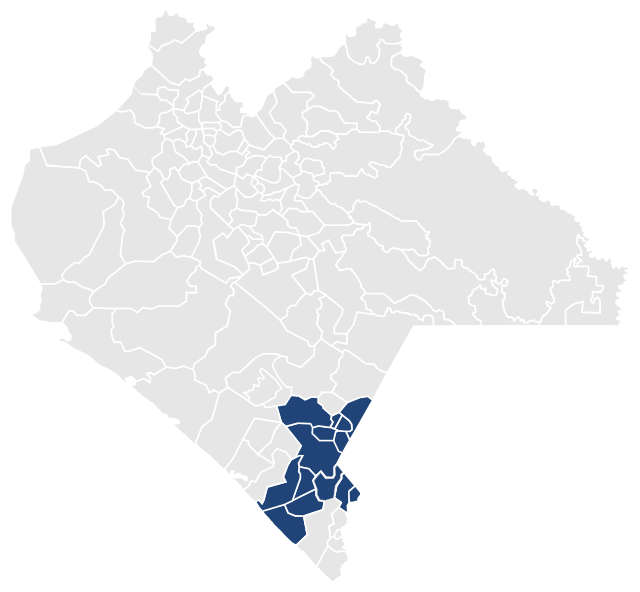Top Qs
Timeline
Chat
Perspective
11th federal electoral district of Chiapas
Federal electoral district of Mexico From Wikipedia, the free encyclopedia
Remove ads
The 11th federal electoral district of Chiapas (Spanish: Distrito electoral federal 11 de Chiapas) is one of the 300 electoral districts into which Mexico is divided for elections to the federal Chamber of Deputies and one of 13 such districts in the state of Chiapas.[1]


It elects one deputy to the lower house of Congress for each three-year legislative session by means of the first-past-the-post system. Votes cast in the district also count towards the calculation of proportional representation ("plurinominal") deputies elected from the third region.[2][3]
The 11th district was created in 1996. Between 1979 and 1996, Chiapas only had nine federal electoral districts; the 1996 redistricting process increased the number to 12.[4] The new district elected its first deputy in the 1997 mid-terms.
The current member for the district, elected in the 2024 general election, is Rosario del Carmen Moreno Villatoro of the National Regeneration Movement (Morena).[5][6]
Remove ads
District territory
Under the 2023 districting plan adopted by the National Electoral Institute (INE), which is to be used for the 2024, 2027 and 2030 federal elections,[7] the 11th district comprises 132 electoral precincts (secciones electorales) across 11 municipalities:[8][9]
- Altamirano, Amatenango del Valle, Chanal, Huixtán, La Independencia, Las Margaritas, Las Rosas, Maravilla Tenejapa, Oxchuc, San Cristóbal de Las Casas (part)[a] and Teopisca.
The head town (cabecera distrital), where results from individual polling stations are gathered together and tallied, is the city of Las Margaritas. The district reported a population of 416,628 in the 2020 Census[1] and, with Indigenous and Afrodescendent inhabitants accounting for over 63% of that total, it is classified by the INE as an indigenous district.[8][b]
Remove ads
Previous districting schemes
| 1974 | 1978 | 1996 | 2005 | 2017 | 2023 | |
|---|---|---|---|---|---|---|
| Chiapas | 6 | 9 | 12 | 12 | 13 | 13 |
| Chamber of Deputies | 196 | 300 | ||||
| Sources: [1][10][4][11] | ||||||
2017–2022
- Between 2017 and 2022, the district covered 10 municipalities: the same as the 2022 plan with the exclusion of Las Rosas.[12][11]
2005–2017
- The district was in the south of the state, covering a portion of the Soconusco region and the Mexico-Guatemala borderlands. It comprised the municipalities of Amatenango de la Frontera, Bejucal de Ocampo, Cacahoatán, El Porvenir, Huehuetán, Huixtla, La Grandeza, Mazapa de Madero, Mazatán, Motozintla, Siltepec, Tuzantán, Unión Juárez and the extreme north of the municipality of Tapachula. The head town was the city of Huixtla.[13]
1996–2005
- Between 1996 and 2005, the district covered only the municipalities of the southern Soconusco:
- Huehuetán, Huixtla, Mazatán and Tuzantán, as in the 2005 scheme, plus:
- Acacoyagua, Acapetagua, Escuintla, Mapastepec and Villa Comaltitlán.[14]
Remove ads
Deputies returned to Congress
Presidential elections
Notes
- The remainder of San Cristóbal de Las Casas is assigned to the 5th district.
- The INE deems any local or federal electoral district where Indigenous or Afrodescendent inhabitants number 40% or more of the population to be an indigenous district.[1]
References
Wikiwand - on
Seamless Wikipedia browsing. On steroids.
Remove ads


